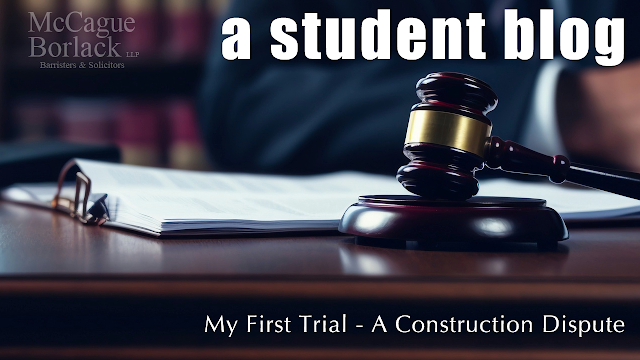Friday, 16 February 2024
Running Your Own Trial as an Articling Student
I’ll always remember the day when I stepped into the managing partner’s office, and he said, “Nick, you’re going to trial.” A rush of adrenaline and nerves flushed through my body.
This was a two-day small claims court trial where I was responsible for defending an action brought by homeowners against a general contractor.
Half the battle was trying to understand the nuts and bolts of construction practices. I had to spend some time Googling basic carpentry, plumbing and electrical work to familiarize myself with industry standards and Code requirements. You think I would be a handyman by now!
On the legal side of things, I had to work out a case theory. To start with, I read the whole file and jotted down notes about things I felt were important. I did this more times than I care to admit, but I wanted to ensure that I understood the ins and outs of the case and was fully prepared.
The days turned into weeks of trial prep. Countless hours were spent reviewing contracts, emails, photos and invoices to piece together the case like a puzzle. I had to think strategically about what evidence I wanted to introduce as exhibits to support our defence. This became a lot easier once I finally had my theory of the case after reviewing the law--a homeowner must give a contractor a reasonable opportunity to remediate any alleged deficiencies in its work before claiming damages. This is what I built the case around.
The day finally came. I walked into the courthouse with my banker's box full of evidence, a book of authorities, and a list of questions I prepared for the witnesses. I had never been so nervous in my life. However, I felt more settled once things got underway. I thought, I know the case now I just have to defend it.
Throughout the two-day small claims trial, I had the opportunity to make an opening statement by setting out a roadmap for the deputy judge, cross-examine witnesses, engage in direct examination of our own witnesses, make evidentiary objections where I saw fit, and make closing submissions to the deputy judge by tying the evidence together with the law.
The most important lesson I learned from this experience is that you need to be attentive and adaptable throughout the trial and change your strategy at times, depending on the answers given by witnesses. For example, I had to cross-examine a witness on the fly that I did not have any questions prepared for based on new evidence that came to light that I knew I had to challenge. I asked briefly for the Court’s indulgence and then started my cross, which felt natural because I had my theory and knew what to question the witness about.
The deputy judge reserved his decision. Regardless of the result, I feel proud and confident knowing I was trusted to put forth the best possible defence for the client. I now have my first trial under my belt, and it only took being an articling student for it to happen.
by Nicholas T.

